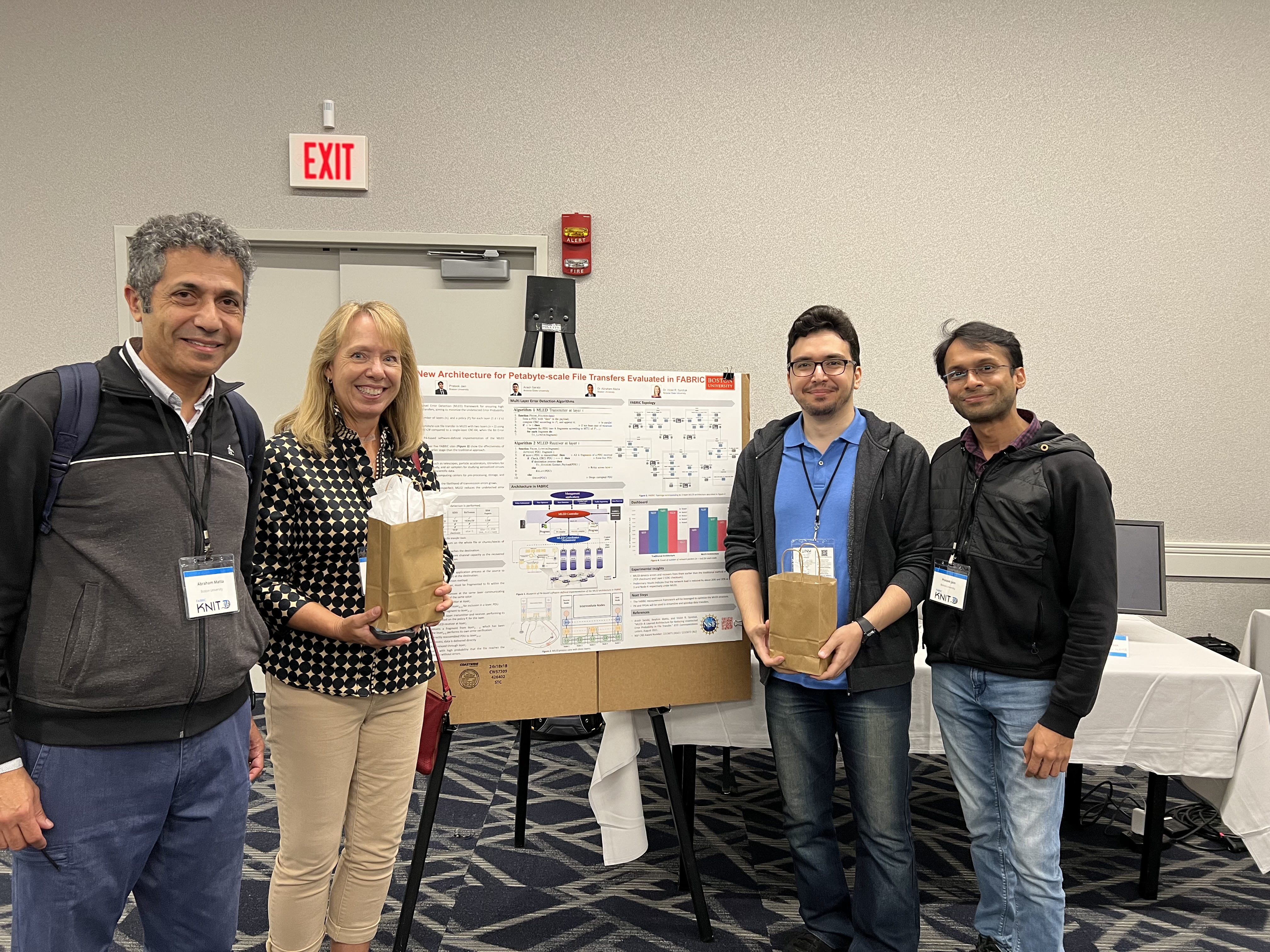Collaborative Research: CNS Core: Small: A New Architecture for Petabyte-scale File Transfer Evaluated in FABRIC
PIs: Violet R. Syrotiuk (ASU) and Ibrahim Matta (BU)
NSF CNS Award Number: 2215671
Project Summary:
Overview. Scientists routinely use instruments to gather massive data sets. As examples, these include telescopes and particle accelerators to study the universe at large and small scales, respectively, tiltmeters to measure ground-deformation to study volcanoes, anemometers and other instruments to measure features of the Earth to study climate change, and air sampling technologies to study aerosolized viruses such as Covid-19.
Such data sets are stored in files that are transferred across the Internet to super-computing centers where they may undergo pre-processing before being archived and exchanged among researchers studying key science questions. As data sets increase in size it is more likely errors are introduced into the files during file transfer. Existing tools for file transfer use methods from coding-theory, compression, and encryption for error detection. However, error detection is inherently imperfect leaving undetected errors that may compromise scientific conclusions. Motivated by the importance of data integrity, this project proposes a multi-layer error detection (MLED) architecture that provably reduces the probability of undetected errors (P_{ue}), implemented and evaluated in FABRIC, an emerging technology of networked computing systems.
Intellectual Merit. The MLED architecture consists of n layers where each layer is parameterized by a policy that includes the scope of the error detection method among other application requirements. When aggregated, the layers both improve error detection capabilities and significantly reduce P_{ue}. Three research directions are planned in this project:
- Develop the theory of MLED to study the trade-offs among the policy parameters to optimize both P_{ue} and file transfer delay.
- Design a P4-based software-defined implementation of MLED exploiting features in FABRIC, a new testbed of networked computing systems. FABRIC's measurement framework allows MLED to collect, store, and process measurements to support instantiation of slices and optimization of policies in managing file transfers. FABRIC's in-network compute, memory, and storage allows a parallel implementation of CRCs on FPGAs to support multiple concurrent flows, to reduce delay through pipelining, and to improve reliability through multi-path routing and caching.
- Evaluate MLED to investigate and understand the design trade-offs that must be navigated to harness FABRIC, to validate the theory, and to compare to other tools across the spectrum of file transfer solutions.
Broader Impacts. This project impacts the science of understanding networked computing systems through the design and implementation of the MLED architecture using features of FABRIC that are unavailable in other network testbeds. Reliable file transfer across a network is especially important when the files store data that capture a rare event, or the conclusions drawn critically depend on their correctness, with potential consequences to scientific knowledge and public health. In addition, MLED advances data science to better understand undetected errors, their propagation through file transfer, and management of massive data sets. FABRIC Across Borders (FAB) offers the opportunity to use MLED for petabyte-scale file transfer across the oceans.
Outreach activities will share experience using FABRIC network elements with the testbed community and promote the adoption of MLED for file transfer. By the end of this project, it will have contributed towards NSF and national research priorities on networked computing systems, and helped educate graduate and undergraduate students, while broadening participation of underrepresented minorities.
Publications:
Journal Papers:
- A. Sarabi, I. Matta, V. R. Syrotiuk, ``MLED: A Layered Architecture for Reducing Undetected Error Probability in File Transfer,'' IEEE Communications Letters, 25(11), 3542-3545, November 2021.
Awards:
-


Best demo (of 19) award at KNIT 7, A FABRIC Community Workshop, in Columbus, Ohio, September 28, 2023. On the left, Arash Sarabi and Prateek Jain being awarded best demo by Bryttany Todd and Chelsea Noyes of FABRIC. On the right, our team: Prof. Ibrahim Matta (BU), Prof. Violet Syrotiuk (ASU), Arash Sarabi (ASU), and Prateek Jain (BU).
